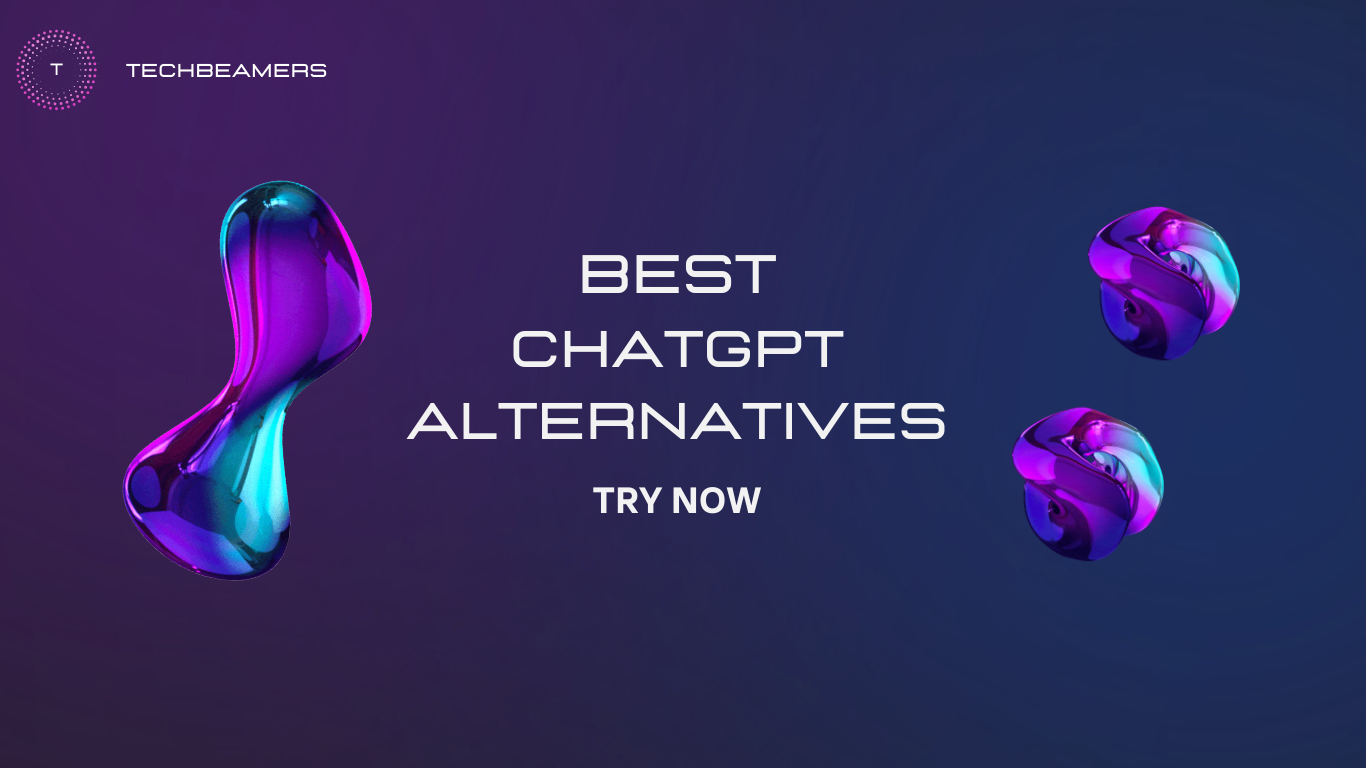Hello, friends. In this article, we’ll explore the 20 most promising ChatGPT alternatives. Some of these are providing the latest AI and NLP features for free. So, they are worth a try.
Starting with ChatGPT which is a unique AI chatbot. It has completely changed how people ask questions and get answers. With its advanced AI and natural language processing system, ChatGPT offers a simple and natural mode of communication.
- Why Need a ChatGPT Alternative?
- ChatGPT Alternatives List
- Google Bard AI
- Microsoft Bing Chat
- ChatSonic
- Jasper.ai
- DeepL Write
- NeevaAI
- OpenAI Playground
- Replika
- Elicit
- YouChat
- Amazon CodeWhisperer
- Chai AI
- Bloom
- Character.AI
- CoGram
- Chinchilla AI
- Learnt.ai
- GitHub Copilot X
- Perplexity AI
- Claude AI
- Try a ChatGPT Alternative Today
From answering complex questions to giving specific suggestions, it has become an indispensable tool for countless individuals. However, it is not alone in the AI bot space. A new breed of ChatGPT alternative has emerged.
These alternatives are designed to address the problems with ChatGPT, while still providing users with the same great features.
Similarly, we have created a list of free PutLocker Alternatives, park it in your bookmarks to read later.
Why Need a ChatGPT Alternative?
Sometimes, the servers that power ChatGPT are often under stress, making it difficult or impossible to use the bot. ChatGPT, in its current version, does not have direct access to the internet or the ability to get real-time information.
Additionally, there have been concerns about the spread of misinformation and propaganda through ChatGPT. To address these issues, various ChatGPT alternatives have emerged. These alternatives aim to tackle the problems while offering similar features.
But be careful! Not all ChatGPT alternatives are created equal. Some of these are designed to collect your data or to spread rumors. Hence, it is important to do your research before choosing a ChatGPT alternative. Read reviews, compare features, and select a safe and reliable alternative.
ChatGPT Alternatives List
With so many great ChatGPT alternatives available, there is no reason to put up with the problems of ChatGPT. Find an alternative that works for you, and start enjoying the benefits of AI chatbots today.
Also Read: Understand the Difference Between ChatGPT and GPT-4
Google Bard AI
Google Bard AI is an experimental and interactive AI service that uses Google’s PaLM 2 LLM. It aims to provide users with information quickly by offering immediate answers at the top of search results.
Bard AI excels in understanding complex queries and providing relevant answers. However, it is still in the experimental stage. Hence, its accuracy may not be as reliable as other AI tools.
Pros:
- 16 different types of responses
- High accuracy in producing text content
- Free to use
Cons:
- Experimental.
- Limited access.
Microsoft Bing Chat
Microsoft Bing Chat is a new chatbot interface powered by OpenAI. It competes with ChatGPT, Perplexity AI, and Google’s Bard. Bing Chat aims to offer users an interactive search experience, allowing them to ask questions naturally and receive answers.
It uses OpenAI’s GPT-3 language model to understand and respond to various queries. Bing Chat is also integrated into the Bing search engine.
Pros:
- User-friendly and easily adjustable chatbot
- Natural language processing
- Ability to create your chatbot
- Free to use
Cons:
- Limited to the Bing search engine.
ChatSonic
ChatSonic, developed by Writesonic, is an advanced AI-powered chatbot platform that enables businesses and individuals to boost client engagements. It uses the latest GPT-4 model and incorporates NLP and ML technology to automate text and image generation.
ChatSonic stands out for its exceptional ability to provide human-level responses infused with machine-level intelligence, making it a superb conversational AI chatbot. It can perform various tasks such as answering questions, producing content, summarizing books, and offering sources.
Integration with Google Search ensures up-to-date content generation, while the addition of visuals and voice commands improves the user experience.
Pros:
- Enables better and faster client interactions.
- Utilizes NLP and ML for producing natural responses.
- Capable of tasks like answering questions and content creation.
- Integrates with Google Search
- Generates visuals, voice commands, and more.
- Free trial available
Cons:
- Limited to online search and chatbot use.
- Some users may face challenges with the cost.
Jasper.ai
Jasper.ai is an AI tool that uses a generative AI engine to deliver information. It is based on OpenAI’s GPT-3 API and aims to provide more accurate and relevant results.
Jasper.ai stands out for its capability to grasp natural language queries and provide quick and relevant answers. However, its accuracy may not be as high as other AI tools.
Pros:
- Streamlines and automates customer support.
- Offers various output options, including reporting and data.
- Recognized for better and faster processing of data.
- Free to use
Cons:
- Primarily tailored for business applications.
- Some users have encountered challenges with customization and cost management.
DeepL Write
DeepL Write is an exceptional language translation tool that harnesses the power of a neural network to deliver highly accurate translations. Developed by DeepL, this tool surpasses other translation tools in precision and reliability.
One of the standout features of DeepL Write is its ability to grasp and translate complex sentences while ensuring fast and correct results.
Pros:
- Grammar checker, style editor, and writing mentor in one package
- Ideal for businesses
- Range of features to help writers improve their writing skills
- Free plagiarism checker
Cons:
- Primarily focused on assisting with writing tasks
NeevaAI
NeevaAI is an innovative search engine that employs a chatbot-style interface. It uses a proprietary search engine, aiming to offer more precise and relevant results.
NeevaAI excels in understanding natural language queries and providing swift and relevant answers. However, since it is relatively new, its accuracy may not be as refined as other AI tools on the list.
Pros:
- Offers a search experience that values privacy.
- A proprietary engine drives its search for faster results.
- Free option to check plagiarism.
Cons:
- Primarily focused on search functionality, limiting its scope beyond that domain.
OpenAI Playground
OpenAI Playground is an AI experimentation platform that enables users to explore and experiment with artificial intelligence (AI) easily.
Unlike Amazon CodeWhisperer and similar coding assistants, OpenAI Playground is mainly focused on helping coders learn and experiment with AI and machine learning.
It is an open-source that offers a wide range of tools for AI education and training, including tutorials, sample projects, and a library of pre-trained models.
Pros:
- Designed to support learning with AI and machine learning.
- Offers a suite of tools for AI education and training.
- Allow checking for plagiarism for free
Cons:
- Primarily focused on AI and machine learning applications.
Replika
Replika is an AI platform that competes with OpenAI’s ChatGPT and other chatbots. It focuses on delivering a more personal and emotional chatbot experience to users. Replika uses its proprietary generative AI engine to provide natural language responses to user queries.
Pros:
- Provides a custom-made and human-like chatbot experience.
- Ability to learn from its users
- Free to use
Cons:
- Primarily limited to the chatbot experience.
Elicit
Elicit is an AI-powered research assistant that serves as an excellent alternative to ChatGPT. It uses GPT-3 to automate various approaches and processes, such as literature reviews.
Elicit offers a unique capability where users can discover relevant papers for their research without relying solely on precise keyword matches. It also aids in extracting crucial data from journals.
While ChatGPT excels at answering general questions, Elicit focuses its AI powers on research-oriented queries. The best part is that Elicit is free to use, making it an ideal choice for students and researchers seeking answers, writing term papers, expanding knowledge, and charting the course of their research.
Pros:
- Excellent tool for research purposes.
- Utilizes language models like GPT-3.
- Enables users to find relevant research papers.
- Helps in getting important information and producing synopses.
- Free to use, making it accessible to students and researchers.
Cons:
- Primarily tailored for answering research questions based on data from research papers, may not be the optimal choice for general inquiries.
YouChat
YouChat is an AI-powered conversational search assistant that revolutionizes online searches for businesses and individuals. It offers an interactive experience, combining advanced language models and powerful search algorithms.
YouChat excels in data analysis and data processing. What sets YouChat apart is its unique ability to provide citations for answers.
Pros:
- Facilitates online searches for businesses and individuals.
- Demonstrates high-speed and accurate data processing.
- Provides citations for answers.
Cons:
- Primarily focused on online search and chatbot.
Amazon CodeWhisperer
Amazon CodeWhisperer is an AI-powered coding assistant that competes with OpenAI’s Codex and other coding assistants. It aims to help developers improve the quality of their code by sharing recommendations for performance, security, and maintainability.
Using AI and ML algorithms, CodeWhisperer analyzes code and offers suggestions. It integrates with AWS CodeCommit, AWS CodeBuild, and AWS CodePipeline, raising the overall software development experience.
CodeWhisperer is available in two tiers: a free individual tier and a professional tier for organizations seeking administrative control.
Pros:
- Guides developers in writing better code.
- Utilizes AI and ML to analyze and enhance code.
- Integrates with various AWS services.
- Available in two tiers: individual and professional.
Cons:
- Primarily focused on coding assistance.
Chai AI
Chai AI is an advanced AI-powered platform that competes with OpenAI’s ChatGPT and other leading chatbot solutions. It is specifically designed to assist businesses in automating their customer support and sales workflow, making it an excellent choice for easing up operations.
Chai AI takes advantage of its own advanced AI engine to deliver natural responses to user queries.
Pros:
- Strengthen customer support and sales operations through automation.
- Utilizes AI engine to provide users with accurate and natural language responses.
Cons:
- Primarily focused on commercial use cases.
Bloom
Bloom, developed by Microsoft, is an AI-powered model based on advanced GPT-4 technology. With the help of NLP and ML, Bloom automates tasks like answering inquiries, content generation, book summarization, and providing relevant sources.
Pros:
- Improve client experience
- Human-like responses
- Handles a wide range of tasks, including answering questions and producing content
- Integration with Google Search
- Offers visual generation and voice commands
Cons:
- Limited to online search and chatbot.
- Higher customization cost.
Character.AI
Character.AI is a powerful conversational AI platform that competes with OpenAI’s ChatGPT and other chatbots. It specializes in assisting businesses by automating customer support and sales processes.
Using its proprietary generative AI engine, Character.AI provides natural language responses to user queries, creating an enhanced conversational experience.
Pros:
- Streamlines customer support and sales processes
- Deliver accurate and contextually relevant responses.
Cons:
- Primarily tailored for business applications
CoGram
CoGram is an innovative AI-driven coding assistant that provides a robust alternative to Amazon CodeWhisperer and other coding assistants.
Its main objective is to enhance developer productivity by offering real-time code suggestions and efficient coding techniques.
CoGram utilizes an advanced language model to comprehend and address various coding queries effectively.
Pros:
- Provides valuable suggestions for coding tasks
- Powered by its advanced language model
Cons:
- Primarily focused on coding support
Chinchilla AI
Chinchilla AI, developed by Google’s AI firm DeepMind, is an advanced AI-powered language model that competes with OpenAI’s ChatGPT and other leading chatbots.
It offers a wide range of applications, including the creation of chatbots, virtual assistants, predictive models, and various AI-powered solutions.
One notable strength of Chinchilla AI is its exceptional ability to handle large volumes of data securely, making it an ideal choice for tasks that involve extensive data analysis.
Pros:
- Enables the creation of chatbots
- Processes large datasets quickly
Cons:
- Not yet publicly available for general use
Learnt.ai
Learnt.ai is an innovative AI tool that specializes in automating customer support and sales workflows for businesses. It stands as a powerful alternative to ChatGPT, enabling businesses to enhance the efficiency of their customer service and sales operations.
Learnt.ai proves itself unique with its proprietary generative AI engine, which produces natural language responses to user queries. In addition to its interaction capabilities, Learnt.ai also extends to perform text classification and brainstorming tasks.
However, it’s important to note that Learnt.ai is specifically designed for business applications, which limits its applicability outside of this domain.
Pros:
- Streamlined automation
- Generative AI engine
Cons:
- Limited to business use
GitHub Copilot X
GitHub Copilot X is an advanced code completion tool that uses a generative AI engine to offer users code suggestions. Developed on OpenAI’s GPT-3 API, it excels in producing accurate and relevant code suggestions compared to other code tools.
GitHub Copilot X’s remarkable feature lies in its capability to grasp intricate code and swiftly offer precise ideas. However, it is a new tool, its accuracy may not be on par with other AI tools on this list.
Pros:
- Provides suggestions for code snippets and functions.
- Uses OpenAI’s GPT-3 language model.
- Support integration with the GitHub platform.
Cons:
- Primarily focused on coding assistance.
Perplexity AI
Perplexity AI offers a chatbot-style interface and a powerful language model to deliver comprehensive information, making it a search engine with supreme strengths.
It is built upon OpenAI’s GPT-4 API and is designed to provide more current information than ChatGPT, with footnotes that link to data sources. Perplexity AI is still in development, but it received large funding from Yann LeCun, the Chief of AI from Meta and Jeff Dean who works at Google as senior VP.
One of the best features of Perplexity AI is its ability to search specific sources, such as news content, academic notes, and papers from the web. However, it still has some accuracy issues.
Pros:
- Provides good responses and cites sources like Wikipedia to answer queries
- Offers a GPT-4-powered co-pilot mode for better assistance
- Maintains clarity in conversations
- Offers a dark mode
- Free and doesn’t need an account
Cons:
- Accuracy issues
- Still in development and has some caveats attached to its web interface
Claude AI
Claude AI, developed by Anthropic, is an advanced chatbot platform that uses AI to support client interactions. It runs on the latest GPT-4 model, NLP, and ML technology to automate text and image generation.
With human-like responses and impressive machine-level intelligence, Claude AI excels as an AI chatbot. It handles various tasks like answering questions, content creation, and book synthesis.
Integration with Google Search ensures up-to-date content, while other features include visuals and voice commands.
Pros:
- Personalizes client interactions.
- Utilizes advanced NLP and ML technology for text and image generation.
- Produces natural responses with remarkable intelligence.
- Handles tasks such as answering questions, and content creation.
- Integrates with Google Search for the latest content.
Cons:
- Its main focus is on online search and chatbot use.
- Some users may face customization and cost challenges.
Try a ChatGPT Alternative Today
ChatGPT has changed the chatbot world with its advanced features and smooth conversations. As we think about its impact, we should also consider the rise of ChatGPT alternatives. These alternatives address the limitations of ChatGPT and offer users more options.
By trying ChatGPT alternatives, users can explore new features and benefits. These alternatives provide fresh perspectives, improved functions, and better experiences. They offer different prompts, specialized add-ons, and unique ways to produce responses.
When choosing a ChatGPT alternative, be careful. Compare and evaluate features to find one that suits your needs. Look for solutions that prioritize privacy, security, accuracy, and user-friendliness.
While ChatGPT is significant, trying alternatives lets you discover new possibilities. Embracing this diverse range of options enhances your AI-driven conversations to new levels.
Lastly, our site needs your support to remain free. Share this post on social media (Linkedin/Twitter) if you gained some knowledge from this tutorial.






